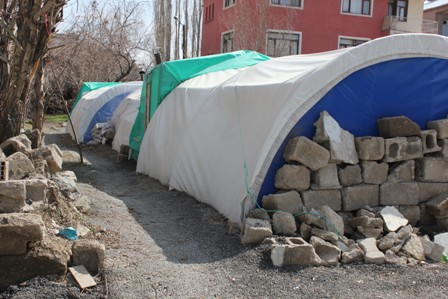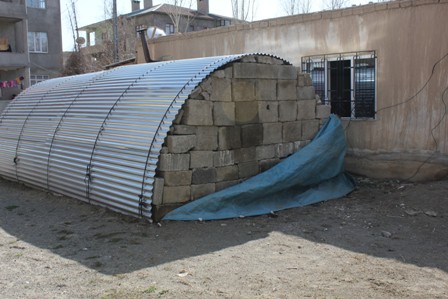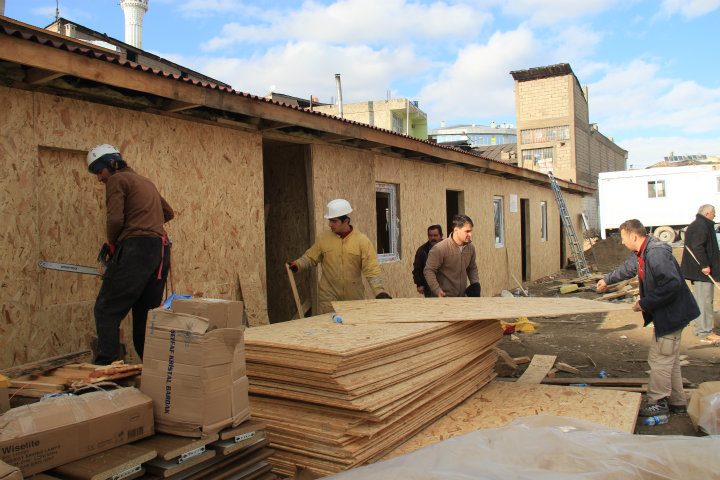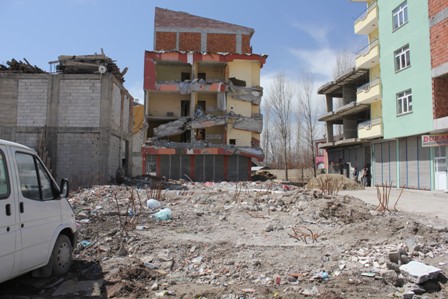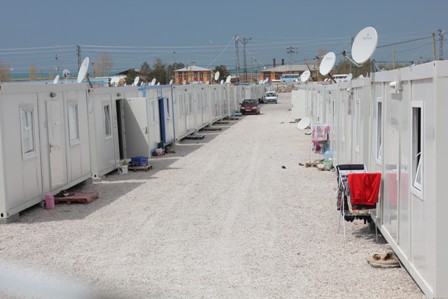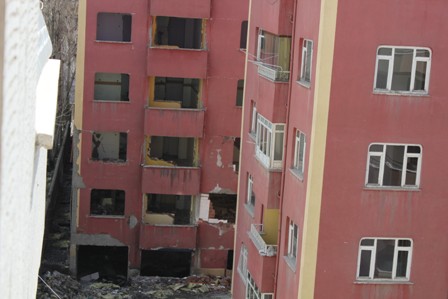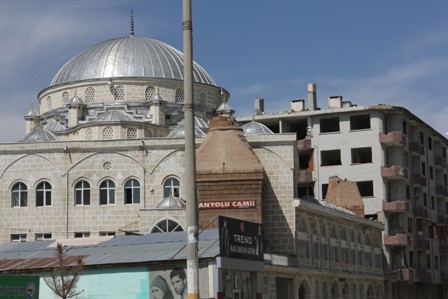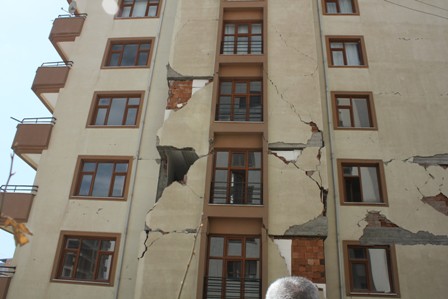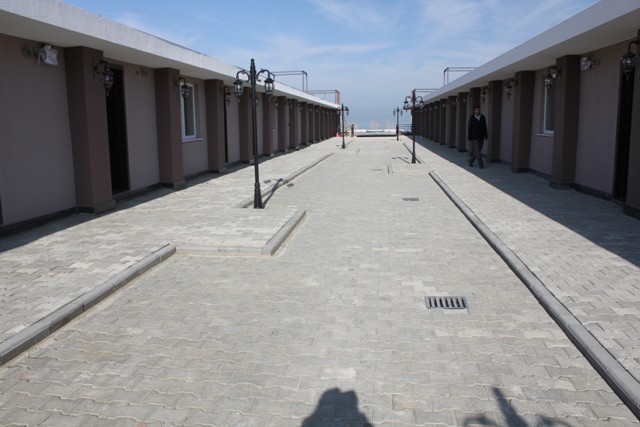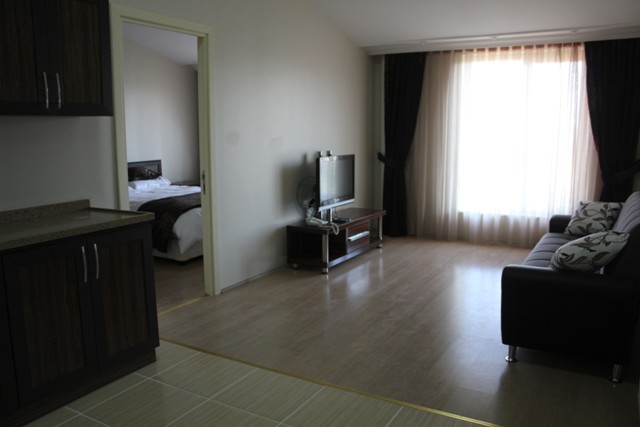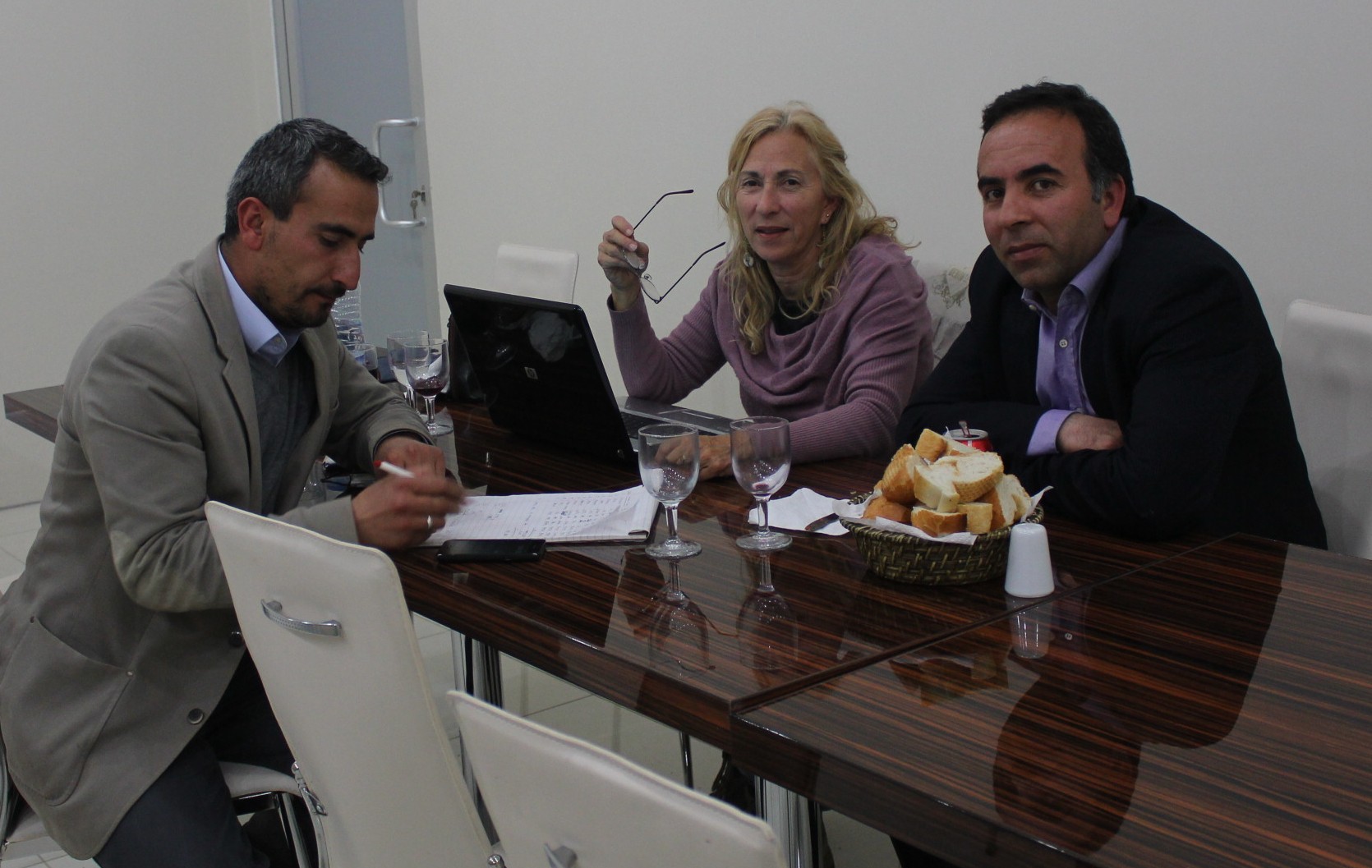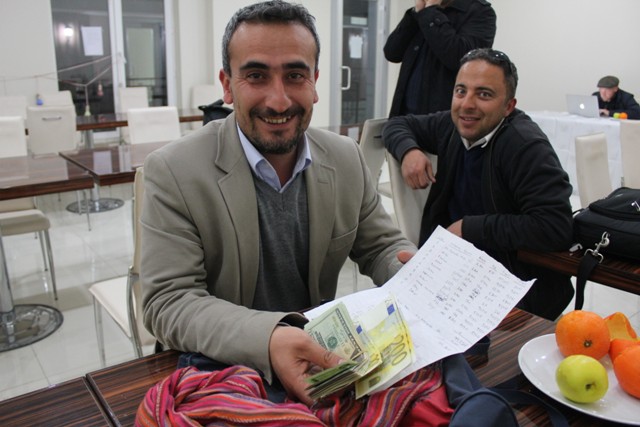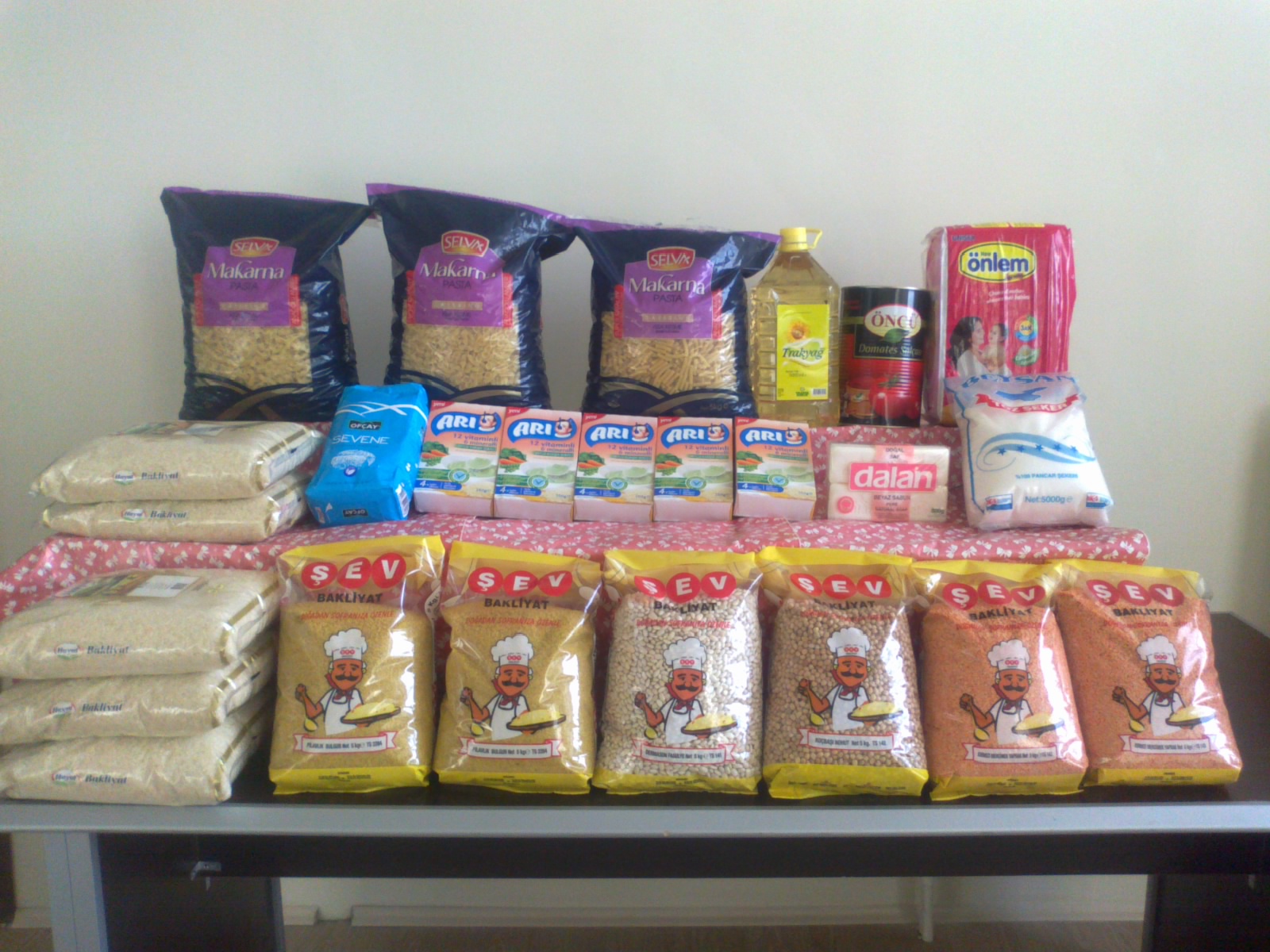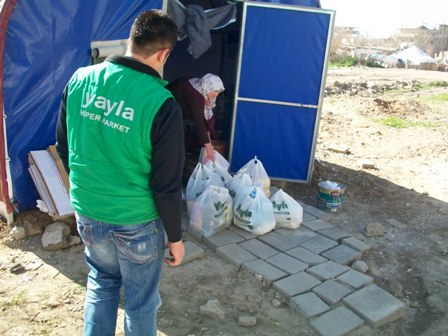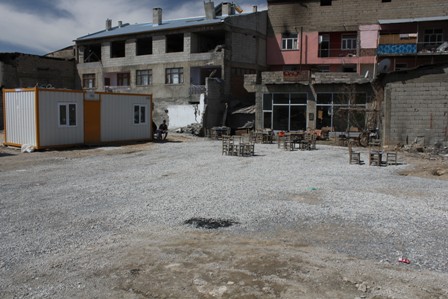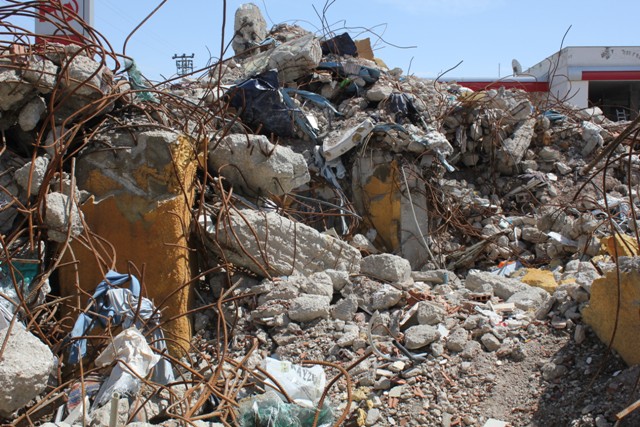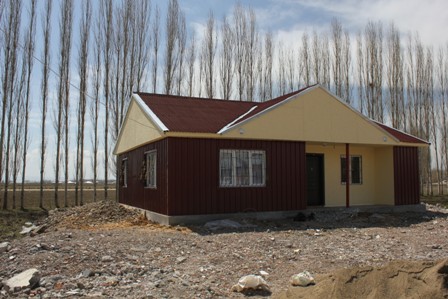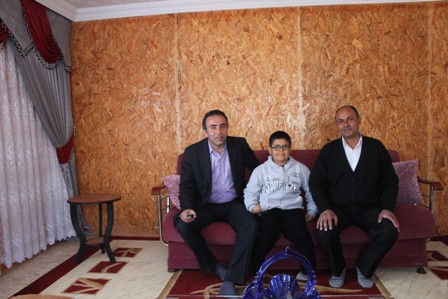|
Turkey's Slow Recovery Six Months after Van Earthquake |
|
|
Van, Turkey, April 21, 2012 - Six months after an earthquake of 7.2 magnitude devastated Ercis and Van in eastern Turkey, survivors are facing hunger, financial ruin, and despair. When the earthquake struck Ercis on the northern shore of Lake Van, October 23, 2011, Mehmet Bozboy, a businessman from Van, and some friends raised money privately to build a wood house in Ercis to shelter some families through the cold winter. When Mr. Bozboy told Dr. Amy L. Beam, operator of Mount Ararat Trek, of the wood house project, she put out an urgent appeal for donations to friends and customers who have climbed to the summit of Mount Ararat near Dogubeyazit, eastern Turkey. Donations were collected to build a second wood house in Van, hit hard by the November 9 earthquake. By the time this second round of fund-raising came in, the house in Ercis was completed and housing eight families. Van, a rapidly growing city in eastern Turkey, had a population of nearly one million people before the earthquake forced most people to leave. Perhaps 100,000 people had no place, nor financial ability to relocate. The Van mayor promised the use of a vacant lot to build a wood house for approximately 80 people. By January most survivors who had not left Van were still living in tents.
Approximately 20 tent fires resulted in the deaths of three children. After the tent fires, liability concerns delayed permission to build the house in Van. Mr. Bozboy spent weeks seeking building permission which ultimately was never given. In late March 2012, when the government dismantled the wood house built in Ercis, Bozboy gave up hope for building the wood house in Van. On April 14, nearly six months after the earthquakes, Beam, Bozboy and the anonymous Ercis house fund-raiser flew to Van. They talked to survivors living in container houses and tents to assess the situation and devise a plan to use the donated funds of 7,200 TL ($4,000 US) raised by Beam and Bozboy. (Another $4000 US in donations is available, pending approval by those who donated to build the second wood house.) Most of the tents have now been replaced by small container houses provided by the government. The residents have been promised they can live in the container houses for three years. By the end of that time, the containers will be removed. The government has promised to build a house for free on land owned by any resident whose house was destroyed. Alternatively, anyone who lost his or her home from the earthquake can buy a house for 100,000 TL (approximately $55,000 USD) built on government-owned land.
The container houses provided by the government are approximately 120 square feet and contain a bathroom and stove top. A typical family of 5 to 8 people is living in cramped conditions in each container house. Although these containers were supposed to be new, the ones that Bozboy and Beam inspected on the inside were clearly used. The floors were broken and sagging and the ceiling was leaking around rusty screws. One complex had approximately 150 container houses at the edge of Van city along the highway. For security the container complex is surrounded by wire fence topped with rolls of razor wire. A police office is at the entrance. After talking with families living in the containers, one man, retired from the government, took Bozboy and Beam to see his 2000-square-foot home on a top floor of one of the new high-rise apartment buildings in Van. There were large cracks on both exterior and interior walls. Wall tiles had fallen off, door frames, window frames, and arches were severely damaged. He purchased this dream home, and beautifully decorated it, only two years ago for $100,000 US dollars. He has a $50,000 bank loan on his apartment. Included with the original bank loan documents was the payment of annual home owner’s insurance. He did not know if the insurance included earthquake coverage. He stated that the bank had not paid the premium to the insurance company. Thousands of similar middle-class residents of Van are in the same circumstances of financial destitution. The banks demand payment of the loans, but the insurance companies are not paying settlements to homeowners. The homeowners’ assets are all in their now uninhabitable homes.
Van is a city of new high-rise apartment buildings that now stand vacant, cracked and crumbled. The government has recently started inspecting buildings to determine if they are structurally sound enough to be repaired or if they must be knocked down. The home owners wait in despair and financial ruin. The man who showed his damaged apartment explained that he and his two sons lived in his van for three months this past winter. Only last week he and his family were assigned a container house in which to live. Bozboy and Beam met them moving in a few items of clothing. Many people complained bitterly that the apartment buildings had been poorly constructed without proper inspections. In contrast to the new but cracked high-rise buildings, the old domed mosques were undamaged. A complex of government-built apartment buildings along the highway was also undamaged.
Because the economic life of Van was destroyed by the earthquake, most people have no jobs. Without jobs, they have no income. If they did have money, they are now bankrupt by their bank loans on their homes which they cannot repay. According to residents who lost their homes, the Turkish government does not offer financial relief or loan forgiveness for earthquake damage of less than 7.6 magnitude. The Van earthquake registered 7.2. After the earthquake, the Turkish government stated that people living in tents would be permitted to use electricity for free. Many people lived in tents or home-made shelters outside their single-family houses, on their own land. They ran extension cords from inside their house to space heaters in the tents. Last week, to their shock and further despair, the government announced that people who had been living in tents on their own property and not on government land had to pay their hefty electric bills from this past winter. Slowly, life is returning to Van. Schools and many shops have reopened. There is traffic in the streets and much construction occurring. Construction dust hangs in the air. More fortunate families have a family member who is back to work such as a school teacher or taxi driver. It will be a long time, however, before full recovery occurs. For some people, this will never happen. All families that Bozboy and Beam spoke with talked about psychological problems of despair. They cannot see a way out of their financial ruin. They do not know what steps to take to begin a new life. Hopelessness is pervasive. Each day is an effort to survive. They are hungry. After a full day assessing the situation in Van and surrounding villages, the team concluded the three most pressing problems are hunger, financial ruin, and despair. All persons interviewed stated the government is not providing food or financial relief. One man bitterly explained, "Fifty cargo planes landed at Van airport with aid, but we never saw any of it. Where did it go?" With the modest amount of 7,200 TL of donated money ($4000 USD), Bozboy and Beam decided to donate food to the neediest of 30 families. (100% of donations went toward purchasing food with no administrative costs withheld.) They met with a school teacher whose two sisters also teach. He put in calls to several school principals. Within two days they compiled a list of 30 needy families, many of them widows with children. Late the same night they met with Mr. Mehmet Bayram, owner of the brand new 30-room Elmali Hotel just outside of Van city. Mr. Bayram is also owner of Yayla grocery stores in Van. Working past midnight, they decided on a food package of basic staples costing 250 TL ($133 UD) after a discount that Mr. Bayram generously gave.
Yayla grocery stores also donated free delivery of the food packages to each family. The food includes 25 kg of rice, 10 kg of lentils, 10 kg of beans, 10 kg of bulgur wheat, 5 kg of sugar, tea, cooking oil, pasta, tomato paste, baby food, pampers, and soap.
The next day the threesome visited Ercis which had a population of 120,000 before the earthquake which killed approximately 3,000 inhabitants. They met with one of the men who had lived for four months in the wood house constructed from the first round of anonymous donations. He was waiting for the team, holding the hand of his seven-year-old son. Both his wife and his 14-year-old daughter died when the building in which they lived collapsed. He and his son lived for two months in his taxi. Over tea, he passed Beam a wedding photo of his wife and another of his daughter. “I lifted my glasses and wiped my eyes,” Beam described. “Then I passed the photos to Mehmet who held his head and sobbed. We had no words; only tears.” The father thanked Mehmet Bozboy and the anonymous fund-raiser for the wood house and explained that not only had she and her friends helped eight families survive four winter months, but also the families had often invited other people to come in from the freezing cold. Many people used the house during the winter. In March, the Ercis government dismantled the house which was built on vacant, city-owned property. It now is a barren gravel lot with two tables and chairs for people to sit and drink tea in the open air.
Surrounding this now vacant lot were piles of rubble from fallen buildings. Our survivor pointed out each pile: “This was a gambling room. Seventy-six people died here. In this building, 80 nurses died. Across the street, 100 students died in their dormitory.” He climbed up on the rubble, picked out a t-shirt and held it up. The pile of twisted steel rods, concrete rubble, and mattresses remains as a memorial six months later. “Within these few blocks of Ercis 500 people died,” he said. Next, the father and son drove to the edge of town to show the team the modest new house he has constructed for himself and his son on a lot owned by his father. He used the wood from the dismantled wood house to make his new house. Friends helped him build the house, and they donated supplies, money, and furniture for its completion. He explained about his despair and sense of hopelessness, but “with this house,” he said, “I have returned to life.” Because of the donations of a small handful of friends and anonymous donors, this man now has a safe home in which to raise his son.
The anonymous donor who raised the funds for the wood house in Ercis calls her form of help “flash philanthropy”. One does not need permission from an NGO or organization to help after a disaster. One can simply ask some friends, devise a plan, and move into action. Mehmet Bozboy and Amy Beam are optimistic that when others learn of their food donation project they might raise enough money to provide food staples for 2 or 3 months to 500 families. Bozboy has a long list of families in dire need. For every $100 dollars donated, one family can receive a package of food staples. With food for several months, they might be able to focus on their next steps toward recovery. Perhaps we cannot save the world, but each one of us can touch a life, one family at a time. For information or to donate, contact Mehmet Bozboy at +9 0535 739 01 38 from within Turkey or email him at memet99@hotmail.com or Amy Beam at amybeam@yahoo.com. Please view a YouTube slide show of Van and Ercis, eastern Turkey, six months after earthquakes hit. Download a .pdf file of this story. |
|
